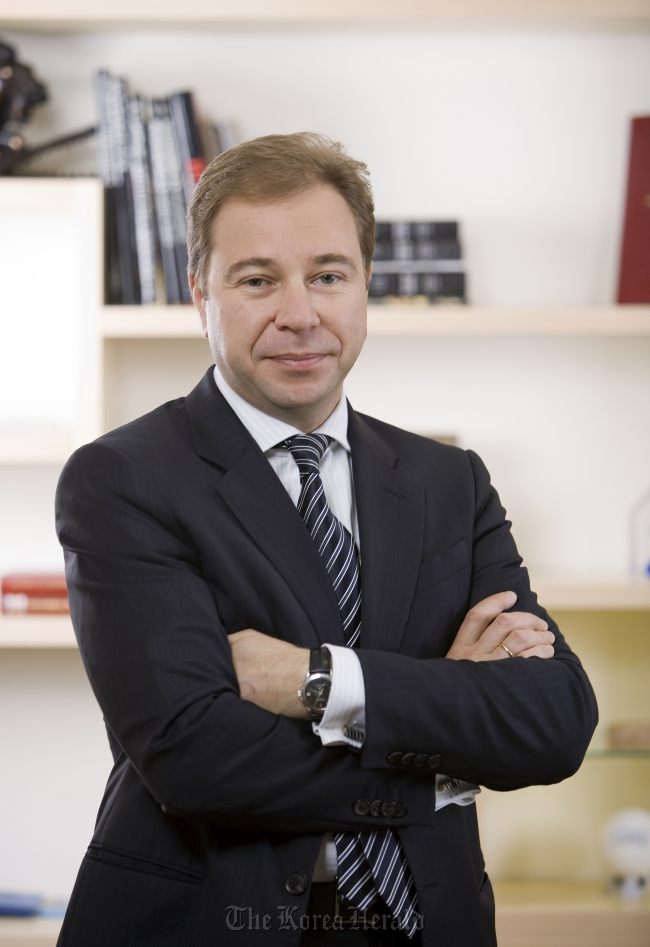The inauguration of Korea’s new government may rev up cooperation between Korea and Russia, particularly in the energy field.
President-elect Park Geun-hye, who is to take office on Monday, earlier pledged to stabilize domestic energy supplies and to achieve a logistics network covering Eurasia.
Eying such potential, En+ Group, a Russia-based diversified mining, metals and energy group, is poised to seek more energy-related cooperation with Korea, including a cross-border electricity supply project.
“Cooperation between Russia and South Korea in the energy sector is constantly strengthening,” Artem Volynets, CEO of the group, told The Korea Herald in an email interview.
 |
En+ CEO Artem Volynets |
“Russian companies supply to Korea over 1.5 billion cubic meters of liquefied natural gas per year, some 1 million tons of coal and about 20 percent of uranium to fuel nuclear plants.”
Cooperation in cross-border electricity supply is likely to be the next big item for the Korea-Russia energy projects, the CEO added.
“Korea is already one of the 10th-largest electricity consumers globally and its demand for electricity is growing. Russia, the second-largest hydro-energy generator, could help Korea to cope with the power shortage issue,” Volynets said.
Russia’s natural energy, however, has only been developed up to the 20 percent level and most undeveloped resources lie in the Eastern Siberia region and the Russian Far East ― both in proximity with the northern part of the Korean Peninsula.
“Hydro energy, an environment-friendly carbon-free energy source, can be delivered to the Korean market via direct submarine cable,” he explained.
Last year, the two countries dealt with the issue in an inter-governmental commission, in which both pledged to support it and recommended it to energy companies from both sides for further development.
Boosted by this, En+ recently started talks with Korea’s state-run electricity provider KEPCO and one of the world’s top cable producers, LS Group, the Russian CEO said.
They are currently working on the first projects, hopefully to be implemented within the year, and are also open to future projects to jointly develop the eastern region of Russia.
Back in 2008, a consortium of scientific institutes from Russia, South Korea and Japan conducted relevant research called the NEAREST Initiative, which stands for Northeast Asian Region Electrical System Ties.
The system involved a circle or loop of electric power transmission lines and submarine cables within Northeast Asian countries with a total capacity of up to 200 gigawatts.
During summer, due to flooding, the eastern part of Russia could have an excessive volume of cheap hydro-power generation and could share it with neighboring countries, according to the CEO.
The corresponding project was hampered by the 2008 global financial crisis but is recently showing signs of revival, though in a slightly different form.
“En+ has started a special research to precisely calculate the optimal way to use Russian energy resources focusing on the North Asian market,” he said.
The project has been approved to start by the governments of Korea, China, Singapore and the United States.
“Hydro-generated energy is the leading topic, but Russia’s resources also include iron ore, coal, gold and many others,” Volynets said.
“We fully support (Park’s) idea of integration of national power grids in Eurasia, and hope to announce at least one big deal with our Korean partner in 2013.”
En+, owned by Russian billionaire Oleg Deripaska, runs the largest independent Russian power plant, as well as a controlling interest in United Company RUSAL, the world’s largest aluminum supplier.
By Bae Hyun-jung (
tellme@heraldcorp.com)








